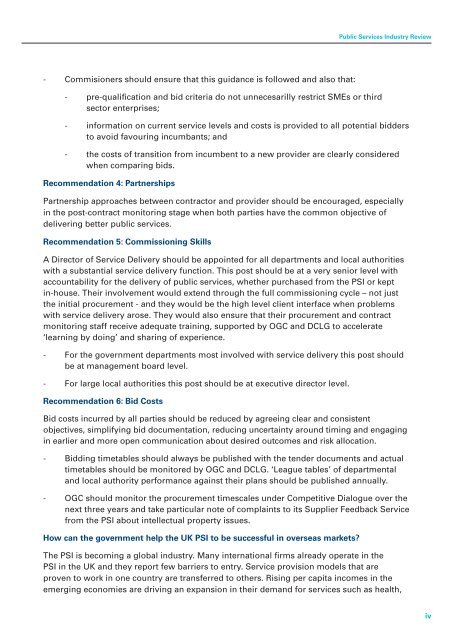Understanding the Public Services Industy
Understanding the Public Services Industy
Understanding the Public Services Industy
You also want an ePaper? Increase the reach of your titles
YUMPU automatically turns print PDFs into web optimized ePapers that Google loves.
<strong>Public</strong> <strong>Services</strong> Industry Review<br />
- Commisioners should ensure that this guidance is followed and also that:<br />
- pre-qualification and bid criteria do not unnecesarilly restrict SMEs or third<br />
sector enterprises;<br />
- information on current service levels and costs is provided to all potential bidders<br />
to avoid favouring incumbants; and<br />
- <strong>the</strong> costs of transition from incumbent to a new provider are clearly considered<br />
when comparing bids.<br />
Recommendation 4: Partnerships<br />
Partnership approaches between contractor and provider should be encouraged, especially<br />
in <strong>the</strong> post-contract monitoring stage when both parties have <strong>the</strong> common objective of<br />
delivering better public services.<br />
Recommendation 5: Commissioning Skills<br />
A Director of Service Delivery should be appointed for all departments and local authorities<br />
with a substantial service delivery function. This post should be at a very senior level with<br />
accountability for <strong>the</strong> delivery of public services, whe<strong>the</strong>r purchased from <strong>the</strong> PSI or kept<br />
in-house. Their involvement would extend through <strong>the</strong> full commissioning cycle – not just<br />
<strong>the</strong> initial procurement - and <strong>the</strong>y would be <strong>the</strong> high level client interface when problems<br />
with service delivery arose. They would also ensure that <strong>the</strong>ir procurement and contract<br />
monitoring staff receive adequate training, supported by OGC and DCLG to accelerate<br />
‘learning by doing’ and sharing of experience.<br />
- For <strong>the</strong> government departments most involved with service delivery this post should<br />
be at management board level.<br />
- For large local authorities this post should be at executive director level.<br />
Recommendation 6: Bid Costs<br />
Bid costs incurred by all parties should be reduced by agreeing clear and consistent<br />
objectives, simplifying bid documentation, reducing uncertainty around timing and engaging<br />
in earlier and more open communication about desired outcomes and risk allocation.<br />
- Bidding timetables should always be published with <strong>the</strong> tender documents and actual<br />
timetables should be monitored by OGC and DCLG. ‘League tables’ of departmental<br />
and local authority performance against <strong>the</strong>ir plans should be published annually.<br />
- OGC should monitor <strong>the</strong> procurement timescales under Competitive Dialogue over <strong>the</strong><br />
next three years and take particular note of complaints to its Supplier Feedback Service<br />
from <strong>the</strong> PSI about intellectual property issues.<br />
How can <strong>the</strong> government help <strong>the</strong> UK PSI to be successful in overseas markets?<br />
The PSI is becoming a global industry. Many international firms already operate in <strong>the</strong><br />
PSI in <strong>the</strong> UK and <strong>the</strong>y report few barriers to entry. Service provision models that are<br />
proven to work in one country are transferred to o<strong>the</strong>rs. Rising per capita incomes in <strong>the</strong><br />
emerging economies are driving an expansion in <strong>the</strong>ir demand for services such as health,<br />
iv
















